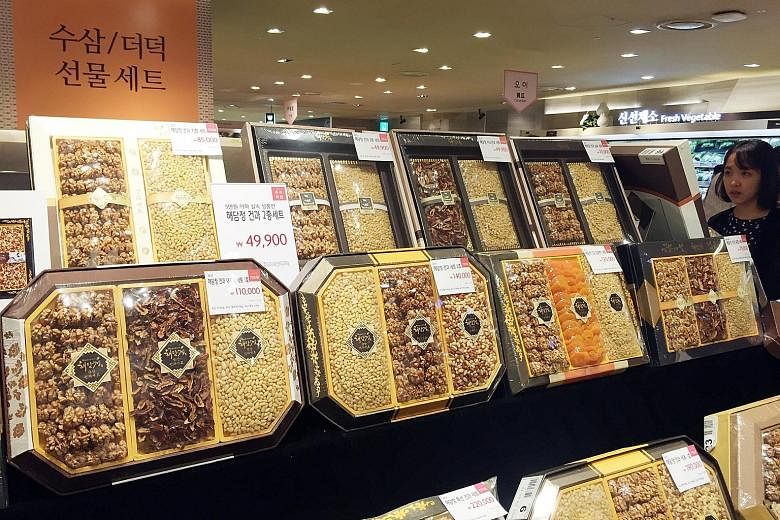Gift-giving in South Korea will not be the same again, once the country's first-ever anti-graft law kicks in later this month.
With the government set to clamp down on corruption, the age-old tradition of giving lavish gifts, golfing treats and expensive meals to win favours will have to change.
Mr Peter Cha, 32, who works in a real estate firm, said he received letters from big corporations stating they will no longer accept gifts for the three-day Chuseok holiday, or Korean Thanksgiving Day, which began on Wednesday.
"The law has set a trend for our society to be more cautious and prudent when giving gifts," he said.
Despite South Korea's rapid economic development in the past few decades, corruption remains rampant and giving expensive presents and meal treats is considered a normal business practice.
-
Three high-profile corruption cases
-
•The governor of South Gyeongsang province, Hong Joon Pyo, was sentenced to 18 months in prison and fined 100 million won (S$121,000) last week for accepting 100 million won in bribes from a businessman. The money was said to be a political donation for Hong when he ran for - and won - the chairmanship of the ruling Saenuri party in 2011.
•Judge Kim Soo Cheon was arrested early this month for allegedly receiving 170 million won in bribes from Mr Jung Woon Ho, former chief executive of cosmetics company Nature Republic. In return, the Incheon district court judge allegedly meted out heavy sentences to com- panies that made and sold fake Nature Republic products.
•Chosun Ilbo newspaper's former chief editor Song Hee Young is being investigated over a nine-day trip to Europe costing at least 200 million won that he allegedly received from Daewoo Shipbuilding and Marine Engineering in 2011, in return for favourable news coverage. He has denied the charge.
Chang May Choon
The Anti-Corruption and Bribery Prohibition Act - also nicknamed the Kim Young Ran Act after the former head of the anti-corruption commission who first proposed it - will seek to eradicate such corrupt practices. It takes effect on Sept 28. It was passed in Parliament in March last year after four years of fierce debate.
For a start, the law will apply only to some four million civil servants, private school teachers, journalists as well as their spouses.
It stipulates that they cannot receive gifts exceeding 50,000 won (S$60), meals above 30,000 won each, and cash gifts above 100,000 won for weddings and funerals, from job-related contacts. Those who break the law face a fine of up to 20 million won or two years' jail.
Sociology professor Andrew Eungi Kim from Korea University's Graduate School of International Studies said the law is a "major step forward" for the country.
He hopes it will bring about positive change in a country where gifts are given not to express gratitude but to ask for favours or swing decisions in one's favour.
"Gift-giving is a product of modern Korea, a highly competitive society without much of a social welfare safety net," he said. "This law will take the pressure off gift-givers."
Signs of change have already emerged.
Ahead of the Chuseok holiday, department stores and retailers rolled out gift sets costing under 50,000 won to attract customers looking for price-appropriate holiday gifts for civil servants.
Upscale restaurants frequented by government officials introduced a 29,000-won set menu, called the Kim Young Ran Set.
Companies have also started to revamp their own anti-bribery rules in line with the new law.
A spokesman for Hyundai Card and Hyundai Capital, the finance arms of Hyundai Motor Group, told The Straits Times that they have started sending their 5,700 employees for lectures and intensive training since early this month so that they will "fully understand and respect" the new law.
Still, the new law is not without controversy. Legislators are exempt from it, calling into question its fairness and effectiveness. There have been calls for the law to include other bribery-prone professionals such as doctors.
Experts have warned that the law could dampen consumption and deal a serious blow to the already sluggish economy.
The Korea Economic Research Institute estimates that the economy could suffer a loss of 11 trillion won as a result.
The farming and fishing sectors, which have traditionally enjoyed a big surge in demand during festive periods, are expected to be hard hit. Department stores also expect a 20 per cent drop in sales over the Chuseok period, said local reports.
In the long run, however, the law is expected to clean up the country, promote greater transparency and bring about economic benefits.
A recent survey of 1,000 adults by cable channel JTBC showed that 64 per cent supported the law, with 7.3 per cent opposed to it. The rest were neutral.
Mr Daniel Choi, 43, who works at a government-linked agency, hopes the law can be strengthened further.
"Korean society has been too generous towards corruption. I get angry every time I read about corruption cases and don't understand why we can't have a clean society like Singapore," he said.

